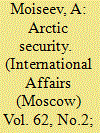| Srl | Item |
| 1 |
ID:
146275


|
|
|
|
|
| Summary/Abstract |
THE ARCTIC REGION attracts the attention of a far larger number of states than those that are adjacent to it. The massive melting of Arctic ice provides broad opportunities for opening new maritime routes and for prospecting for natural resources, and the development of energy and trade; it is also fraught with a serious conflict in the Arctic. The international community has already appreciated the economic attractiveness of the Arctic, and states began to argue about the redrawing of Arctic boundaries. Arctic and non-Arctic states are becoming increasingly involved in the efforts to review them.
|
|
|
|
|
|
|
|
|
|
|
|
|
|
|
|
| 2 |
ID:
121224


|
|
|
|
|
| Publication |
2012.
|
| Summary/Abstract |
The Arctic Council is a high-level, mainly intergovernmental forum for
cooperation, coordination, and interaction among Arctic states,1
indigenous
groups, and interested parties of two issue areas, sustainable development in
the Arctic and the protection and study of the fragile Arctic ecosystem. The
council is poorly understood and little advertised. And while it cannot enact
binding legislation (except among the member states) or discuss issues of
military security, these supposed "weaknesses" have actually helped to forge
consensus in other important issue areas.
|
|
|
|
|
|
|
|
|
|
|
|
|
|
|
|
| 3 |
ID:
145651


|
|
|
|
|
| Summary/Abstract |
This article assesses the treaty practice of the five Arctic Ocean coastal states and Iceland in dealing with the issue of transboundary hydrocarbon deposits as part of the conclusion of maritime delimitation and other related agreements. That practice suggests a number of different ways in which states deal with the issue of hydrocarbon deposits bisected by a maritime delimitation: (1) silence, (2) a standard unity of deposit clause, (3) more complex variations on the standard clause including framework agreements for the development of transboundary deposits, and (4) a delimitation line with some form of joint development zone. This article assesses the Arctic state practice within this typology seeking to supplement the existing literature which tends to focus on the North Sea and Southeast Asia.
|
|
|
|
|
|
|
|
|
|
|
|
|
|
|
|